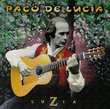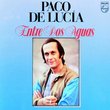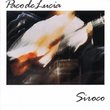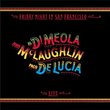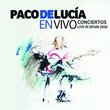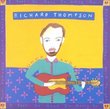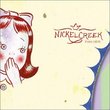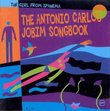| All Artists: Paco De Lucia Title: Cositas Buenas Members Wishing: 0 Total Copies: 0 Label: Blue Thumb Release Date: 1/27/2004 Genres: International Music, Jazz, Pop, Latin Music Styles: Europe, Continental Europe, Latin Music, Flamenco, Latin Jazz, Latin Pop Number of Discs: 1 SwapaCD Credits: 1 Other Editions: Cositas Buenas UPCs: 602498660669, 0602498660669, 2605000017799 |
Search - Paco De Lucia :: Cositas Buenas
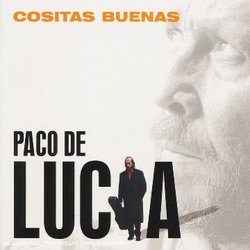 | Paco De Lucia Cositas Buenas Genres: International Music, Jazz, Pop, Latin Music
This is a Rounded and Polished Album that Is, above All, Loyal to Flaminco. Eight Tracks as Regards Both his Own Music and Music in General. Three Bulerias Blaze the Trail "Patio Custodio", "Volar" and "Que Venga El Alba".... more » |
Larger Image |
CD DetailsSynopsis
Album Details This is a Rounded and Polished Album that Is, above All, Loyal to Flaminco. Eight Tracks as Regards Both his Own Music and Music in General. Three Bulerias Blaze the Trail "Patio Custodio", "Volar" and "Que Venga El Alba". On the Last of These, De Lucia Reaches Back in Time to Rescue his Inner Voicec, Camaron De La Isla, and Plays Alongside the Third of the Holy Trinity, Tomatito. Similar CDs
Similarly Requested CDs
|
CD ReviewsTotally flamenco, complete mastery L. K. Coleman | New Orleans, LA USA | 05/17/2004 (5 out of 5 stars) "I had to shake my head when I read one of the reviews expressing disappointment, even though the reviewer's disappointment was due to misinformed expectations. I hasten to add, however, that that misinformation is likely not the reviewer's fault.The ultimate authority for American English, the Merriam Webster Third New International Dictionary, Unabridged, defines "flamenco" as "a vigorous rhythmic dance style of the Andalusian Gypsies," or "a dance in this style," or "music or song accompanying or suitable to accompany such a dance..." Contrast that with the ultimate authority on the Spanish language in Spain, the Diccionario de la Lengua Española, published by the Royal Spanish Academy. Among many other meanings, it gives this definition of the art: "[as an adjective] Indicating that which is Andalusian and which tends to reflect Gypsy characteristics. [as a noun] - Andalusian song or singing, the style or feeling, [of] the category FLAMENCO." (My own translation.) So note carefully: In its country of origin, "flamenco" is first and foremost a type of singing, not dance or guitar; it is "Andalusian" and not just "Gypsy" (which is included in the idea of "Andalusian"); and it literally goes without saying that dance and guitar are included.Considering Merriam Webster's misinformation, it's no surprise that the disappointed reviewer criticized this album as showcasing the singing rather than the guitar - even though it doesn't: when the singing is up-front on an album the guitar stands well to the back, not what Paco does here. But it remains that the singing IS flamenco. That's part of what makes Paco so flamenco: He is the most "complete" guitarist in flamenco's history. He knows accompaniment backwards and forwards, both for the singing and the dance; his rhythm is always driving and flawless; his technique is complete and unexcelled; and he has incredible creativity. But what keeps that creativity so "flamenco" is Paco's thorough knowledge of the singing. In fact, there's never been a flamenco guitar soloist worth a damn who was not first an accompanist.This album is superb, probably the finest album Paco's put out since the seventies. It combines old with new in wonderfully subtle ways, and is filled with surprises even for the most knowledgeable aficionados - but that was obviously one of Paco's goals in doing this album. For example, even though Paco has complete mastery of all the many flamenco guitar techniques, the one for which he is most noted is his powerful yet blindingly fast picado ("scale runs"). Yet on this album he hardly uses any - and it STILL rocks! The thumb technique on the first cut, one of several bulerías, is both mind-boggling and just incredibly "flamenco". It is in this first cut that the singing tells us something: The last verse says that there's an impromptu party with seven people, some to sing, some to dance, and Uh Oh! we forgot to bring a guitarist. "No problem" Paco joins in the chorus, "just play hand claps!" (The hand clapping in flamenco is an art in itself and requires a thorough knowledge of the particular rhythms - and Paco's right, you can accompany everything without guitar just using hand claps.) The second cut, the title cut and a tangos, begins so simply but builds to explosive proportions. (The flamenco tangos are derived from Afro-Cuban rhythms brought back to Spain in the 19th century, very different from the Argentine variety.) The Gypsy singer says "for as much as you loved me, for as much as you adored me, and as much as I used to value that, now I value nothing; so the pains that you give me are not pains but good little things (`cositas buenas')". The third is a soleá por bulería with incredible power and texture. Here Paco sings again to his own accompaniment, for as his song tells us, "Neither pain nor joy can exist without song, so that's why there's more singers than drops of water in the sea and grains of sand in the desert." The fourth and last cuts are the obligatory rumbas for the crowds - excellent but still my least favorites, and are certainly the least "flamenco" on the album. The fifth cut is my personal favorite, a meticulously metered bulería that is filled with surprises and joy - you can actually feel the smiles of Paco and his accompanists. The seventh cut is also a bulería, but with Tomatito as second guitarist (and Paco is the only guitarist for whom Tomatito will play second guitar) accompanying a previously unpublished recording of the deceased Camarón - rather spooky, and with more never before done flourishes on the guitar, this time using rasgueados. And the sixth cut is a tiento (a type of slow, slightly differently inflected tango) done in a manner that is completely different than any tiento done before. It's a revelation in itself, and the singer, El Cigala, returns to the theme of the album: "Come sit at my side because I have to tell you about an ocean of good little things."So there's nothing on this album to be disappointed about. It's filled with surprises for the die-hard aficionado - but those surprises are completely lost unless the listener has a sufficient base of knowledge against which to compare. This is not Paco with DiMeola and McLaughlin, which period in Paco's career was actually a segue for the purpose of expanding his own knowledge. Paco wanted to learn jazz and other concepts since he had done everything in flamenco and needed to be revitalized. He brought those ideas back to the fold of flamenco, refined and then reshaped them. Rhythmically, jazz and rock had little to offer flamenco - actually, quite the reverse. What jazz in particular did have to offer was a great harmonic expansion, and Paco has taken full advantage of that knowledge, transforming and tremendously enlarging flamenco's harmonic scope in the process. And now he has completely absorbed that knowledge and brings to us these wonderful, "good little things," these Cositas Buenas." This is really weird . . . Jan P. Dennis | Monument, CO USA | 05/21/2004 (5 out of 5 stars) ". . . I initially felt I wouldn't like this disc. After all, I didn't want vocals, "palmas" (handclaps), and various other distractions. Yet what the inimitable Paco de Lucia has done here is to definitively demonstrate the absolutely essential role vocals, "palmas," and percussion play in Flamenco music.These seemingly extraneous elements provide the rhythmic ground and metrical interest that serve to invest Flamenco music with the energy that makes is so special--even unique--among world musics. No, we DON'T just want to hear the guitar going off; we want, instead, to hear the guitar situated in a rhythmic context that both frames it and provides it with the occasion to shine.That is the genius of the absolutely remarkable and even revelatory disc: Paco de Lucia has completely understood and imagined the optimal setting for his spectacular music and rendered it with a faithfulness and lucidity seldom if ever encountered before.Pass this one up at your peril." Twilight, Beckoning With Playful Allure Michael F. Hopkins | Buffalo, NY USA | 08/25/2004 (5 out of 5 stars) "There are moments of sheer Music which have the ability
to bring a smile to your heart, and thankful tears to many an eye. Paco de Lucia, in the time in which he has graced the world with the wizardry of his art, has been responsible for many such moments. "Aires de Linares", "Percussion Flamenca", "Almoraima", "Montesario de Sal", his stirring sextet take on "El Vito", his deadly arrangements of Manuel de Falla, his breathtaking embrace of CONCIERTO DE ARANJUEZ are but a few of the precious moments by which de Lucia has inspired the audiences of the world for over 30 years. Truth to tell, after the captivating triumph of de Lucia's recording from a few years ago, the incomparable LUZIA, many wondered if, even for this master of the Flamenco guitar, there were any more summits left. COSITAS BUENAS answers that question with a resounding affirmation of the man, his artistry, and the Music which empowers all. If LUZIA was the sunrise sweeping the waiting horizon, COSITAS BUENAS is the becknoing twilight full of playful allure, and spirits of renewal. A masterpiece of both traditional sound and transitional vision, de Lucia unleashes a beautiful flurry of cabaret sorcery worthy of the immortal Sabicas himself. Voices and instrumentalists join for devout song meant only for the most intimate celebration, and dedicated participation. The air is charged with the weavings of Bulerias, Tientos, Tango and Rumba, with a touch of Solea for special measure. We are blessed by de Lucia's earthy song and gossamer chant, its rolling dance and uplifting romance as sobering in scope and focus as it is exhilirating to experience, and to share. COSITAS BUENAS. Paco de Lucia and friends, after hours, brewing good little things which potently deliver The Big Picture. Only one thing is needed to fulfill this summoning. You. Enter cleanly, and know your own will. Come." |

 Track Listings (8) - Disc #1
Track Listings (8) - Disc #1